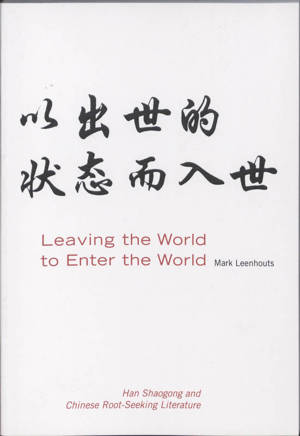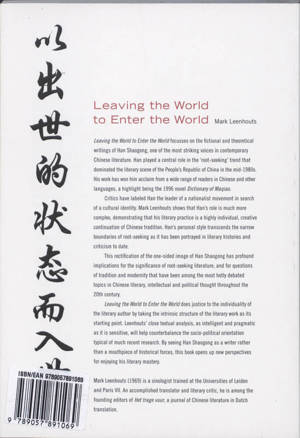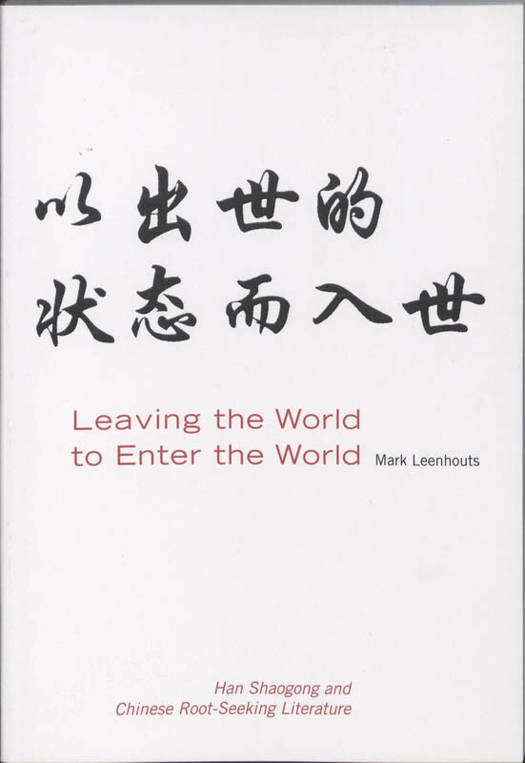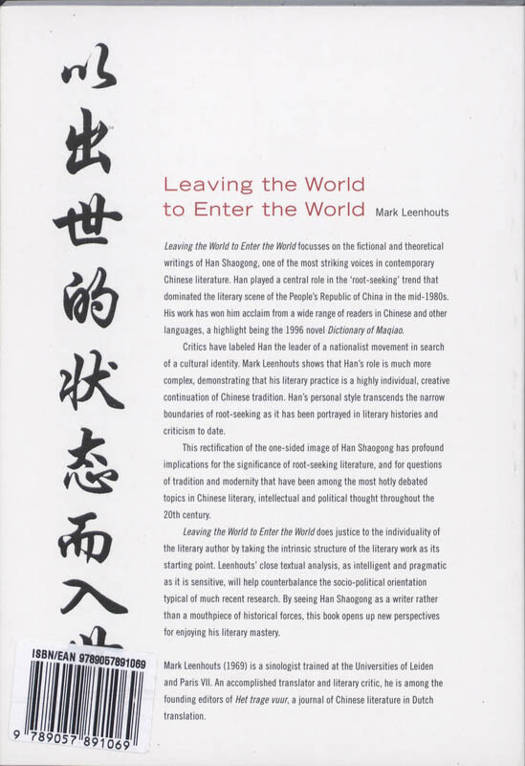
Door een staking bij bpost kan je online bestelling op dit moment iets langer onderweg zijn dan voorzien. Dringend iets nodig? Onze winkels ontvangen jou met open armen!
- Afhalen na 1 uur in een winkel met voorraad
- Gratis thuislevering in België vanaf € 30
- Ruim aanbod met 7 miljoen producten
Door een staking bij bpost kan je online bestelling op dit moment iets langer onderweg zijn dan voorzien. Dringend iets nodig? Onze winkels ontvangen jou met open armen!
- Afhalen na 1 uur in een winkel met voorraad
- Gratis thuislevering in België vanaf € 30
- Ruim aanbod met 7 miljoen producten
Zoeken


Leaving the World to enter the World
Han Shaogong and Chinese Root-Seeking Literature
Mark A. Leenhouts
€ 27,50
+ 55 punten
Omschrijving
'Leaving the World to Enter the World' focuses on the fictional and theoretical writings of Han Shaogong, one of the most striking voices in contemporary Chinese literature. Han played a central role in the ‘root-seeking’ trend that dominated the literary scene of the People’s Republic of China in the mid-1980s. His work has won him acclaim from a wide range of readers in Chinese and other languages, a highlight being the 1996 novel Dictionary of Maqiao.
Critics have labeled Han the leader of a nationalist movement in search of a cultural identity. Mark Leenhouts shows that Han’s role is much more complex, demonstrating that his literary practice is a highly individual, creative continuation of Chinese tradition. Han’s personal style transcends the narrow boundaries of root-seeking as it has been portrayed in literary histories and criticism to date.
This rectification of the one-sided image of Han Shaogong has profound implications for the significance of root-seeking literature, and for questions of tradition and modernity that have been among the most hotly debated topics in Chinese literary, intellectual and political thought throughout the 20th century.
'Leaving the World to Enter the World' does justice to the individuality of the literary author by taking the intrinsic structure of the literary work as its starting point. Leenhouts’ close textual analysis, as intelligent and pragmatic as it is sensitive, will help counterbalance the socio-political orientation typical of much recent research. By seeing Han Shaogong as a writer rather than a mouthpiece of historical forces, this book opens up new perspectives for enjoying his literary mastery.
Critics have labeled Han the leader of a nationalist movement in search of a cultural identity. Mark Leenhouts shows that Han’s role is much more complex, demonstrating that his literary practice is a highly individual, creative continuation of Chinese tradition. Han’s personal style transcends the narrow boundaries of root-seeking as it has been portrayed in literary histories and criticism to date.
This rectification of the one-sided image of Han Shaogong has profound implications for the significance of root-seeking literature, and for questions of tradition and modernity that have been among the most hotly debated topics in Chinese literary, intellectual and political thought throughout the 20th century.
'Leaving the World to Enter the World' does justice to the individuality of the literary author by taking the intrinsic structure of the literary work as its starting point. Leenhouts’ close textual analysis, as intelligent and pragmatic as it is sensitive, will help counterbalance the socio-political orientation typical of much recent research. By seeing Han Shaogong as a writer rather than a mouthpiece of historical forces, this book opens up new perspectives for enjoying his literary mastery.
Specificaties
Betrokkenen
- Auteur(s):
- Uitgeverij:
Inhoud
- Aantal bladzijden:
- 158
- Taal:
- Engels
- Reeks:
- Reeksnummer:
- nr. 136
Eigenschappen
- Productcode (EAN):
- 9789057891069
- Verschijningsdatum:
- 1/07/2005
- Uitvoering:
- Paperback
- Afmetingen:
- 166 mm x 241 mm
- Gewicht:
- 315 g

Alleen bij Standaard Boekhandel
+ 55 punten op je klantenkaart van Standaard Boekhandel
Beoordelingen
We publiceren alleen reviews die voldoen aan de voorwaarden voor reviews. Bekijk onze voorwaarden voor reviews.












